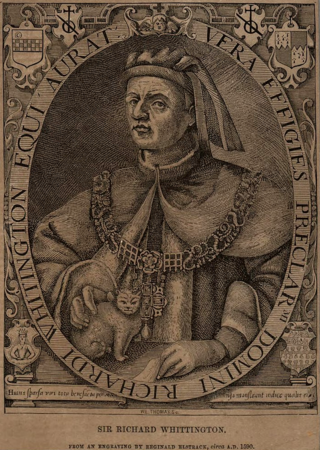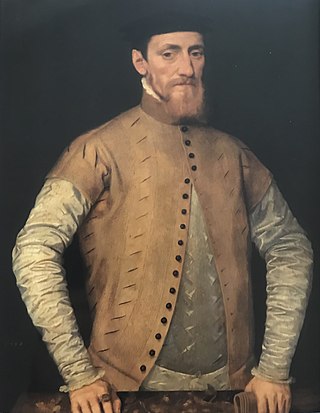Related Research Articles

Richard Whittington of the parish of St Michael Paternoster Royal, City of London, was an English merchant and a politician of the late medieval period. He is also the real-life inspiration for the English folk tale Dick Whittington and His Cat. He was four times Lord Mayor of London, a member of parliament and a Sheriff of London. In his lifetime he financed a number of public projects, such as drainage systems in poor areas of medieval London, and a hospital ward for unmarried mothers. He bequeathed his fortune to form the Charity of Sir Richard Whittington which, nearly 600 years later, continues to assist people in need.
John Northampton was a reformist Lord Mayor of London in 1381 and 1382, during dissension in favour of reform of its Common Council in the early years of Richard II's reign. When the oligarchic leaders of London were able to engineer the overthrow of his faction, even the book of records of reform legislation was burned, known as the Jubilee Book. The radical movements' mob politics heightened public reluctance to permit people's engagement in politics.

Sir William Walworth was an English nobleman and politician who was twice Lord Mayor of London. He is best known for killing Wat Tyler during the Peasants' Revolt in 1381.

Sir Isaac Penington was an English politician who sat in the House of Commons from 1640 to 1653. He was Lord Mayor of London in 1642 and a prominent member of Oliver Cromwell's government.

Sir John Gresham was an English merchant, courtier and financier who worked for King Henry VIII of England, Cardinal Wolsey and Thomas Cromwell. He was Lord Mayor of London and founded Gresham's School. He was the brother of Sir Richard Gresham.

Sir Edmund Shaa or Shaw was a London goldsmith, Sheriff of London in 1475 and Lord Mayor of London in 1482. Shaa lent money to Edward IV and, as mayor, was extensively involved in the coronation of Edward IV's brother Richard III. He was later knighted and made a member of the Privy Council.
Sir Richard Gresham was an English mercer, Merchant Adventurer, Lord Mayor of London, and Member of Parliament. He was the father of Sir Thomas Gresham.

Ralph Boteler, 1st Baron Sudeley KG was an English baron and aristocrat who rose up through the ranks of the courts of King Henry V and Henry VI to become the Lord High Treasurer of England. He fought in the Hundred Years’ War and was made the Captain of Calais; and was later present at the execution of Joan of Arc. He is most notably remembered for largely rebuilding the Manor of the More, later home of Queen Catherine of Aragon, and Sudeley Castle, the final home and resting place of Queen Katherine Parr.

John Fowke was an English merchant and politician. He served as a Sheriff of London for 1644 and Lord Mayor of London for 1652.

Edward North, 1st Baron North was an English peer and politician. He was the Clerk of the Parliaments 1531–1540 and Lord Lieutenant of Cambridgeshire 1557–1564. A successful lawyer, he was created the first Baron North, giving him a seat in the House of Lords.

Thomas Murfyn, was a Sheriff and Lord Mayor of London.
Sir John Pakington, was Chirographer of the Court of Common Pleas, a Member of Parliament for Gloucester, and Sheriff of Herefordshire and Worcestershire. In 1529 he received an extraordinary grant from Henry VIII permitting him to wear his hat in the King's presence.
John Gayer or Gayre was an English merchant who was Lord Mayor of London in 1646.

Sir Rowland Hayward was a London slave merchant, and Lord Mayor of the City in both 1570 and 1591. Through his commercial activities he acquired considerable wealth, and was able to loan money to Queen Elizabeth I and purchase properties in several counties as well as houses in and near London. He entertained the Queen at King's Place in 1587.
Sir John Shaa or Shaw was a London goldsmith. He served as engraver and later joint Master of the Mint, and as Sheriff and Lord Mayor of London. While Lord Mayor he entertained ambassadors from Scotland, and was among those who welcomed Catherine of Aragon to England. He is mentioned in a poem by William Dunbar.

Sir Thomas Tuddenham was an influential Norfolk landowner, official and courtier. He served as Steward of the Duchy of Lancaster, and Keeper of the Great Wardrobe. During the Wars of the Roses he allied himself with the Lancastrian side, and after the Yorkist victory in 1461 was charged with treason and beheaded on Tower Hill on 23 February 1462.
Sir John Spencer was a successful English merchant and Lord Mayor of London.
Sir Henry Colet was twice Lord Mayor of London.
Sir Thomas Ramsey (1510/11–1590) was a merchant, and an Alderman of London from 1566 to 1590. He was knighted, served as Sheriff in 1567–68 and Lord Mayor in 1577–78. His second wife Mary Ramsey was a noted philanthropist.
Alice Hampton was a rich English vowess and benefactor. She is considered to be the only vowess who was not married. She became rich when her uncle, William Hampton, died.
References
- 1 2 3 Wood, Laura M. (24 May 2012). "Hampton, Alice (d. 1516), vowess and benefactor". Oxford Dictionary of National Biography. Oxford Dictionary of National Biography (online ed.). Oxford University Press. doi:10.1093/ref:odnb/102118. ISBN 978-0-19-861412-8.(Subscription or UK public library membership required.)
- ↑ "The Lord Mayors of London | British History Online". www.british-history.ac.uk. Retrieved 15 November 2018.